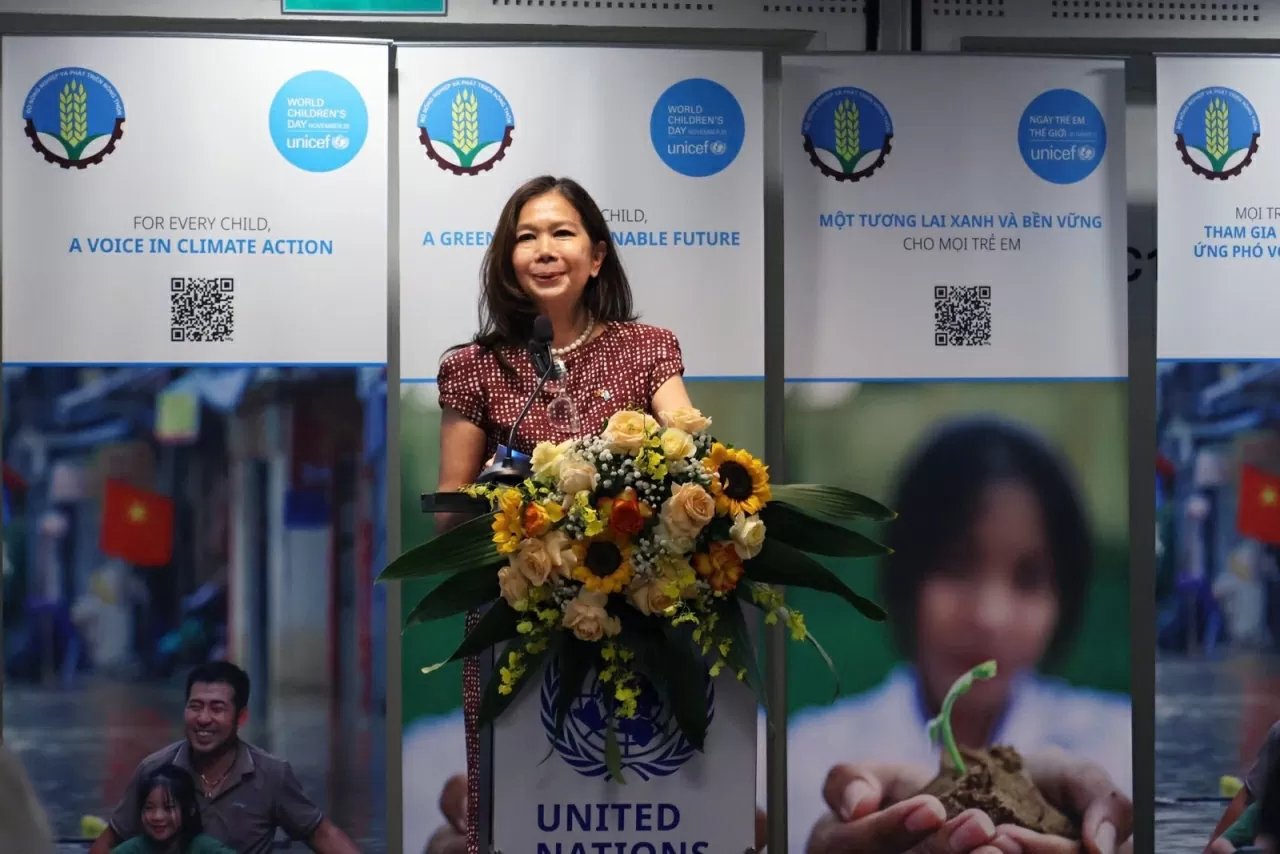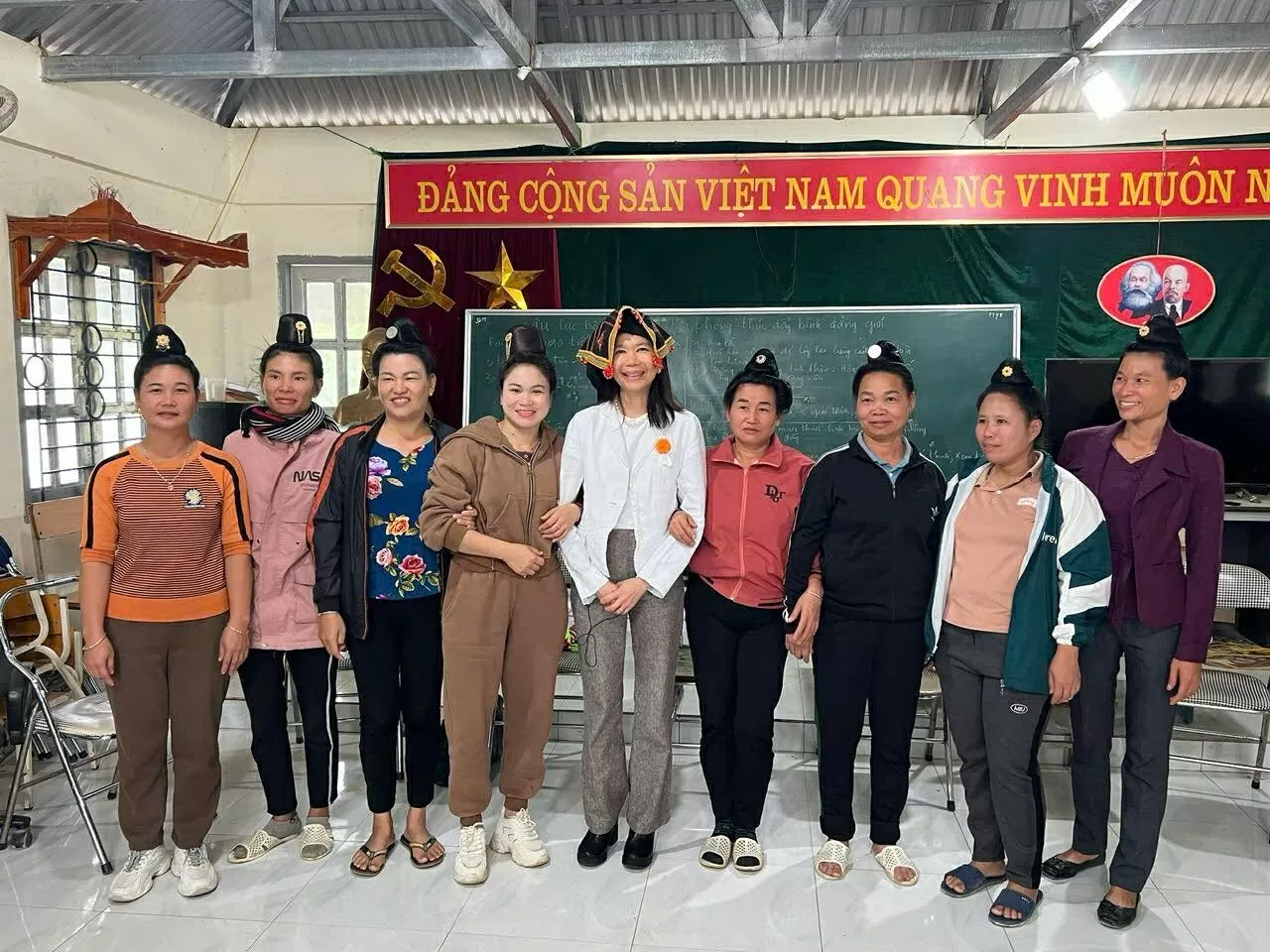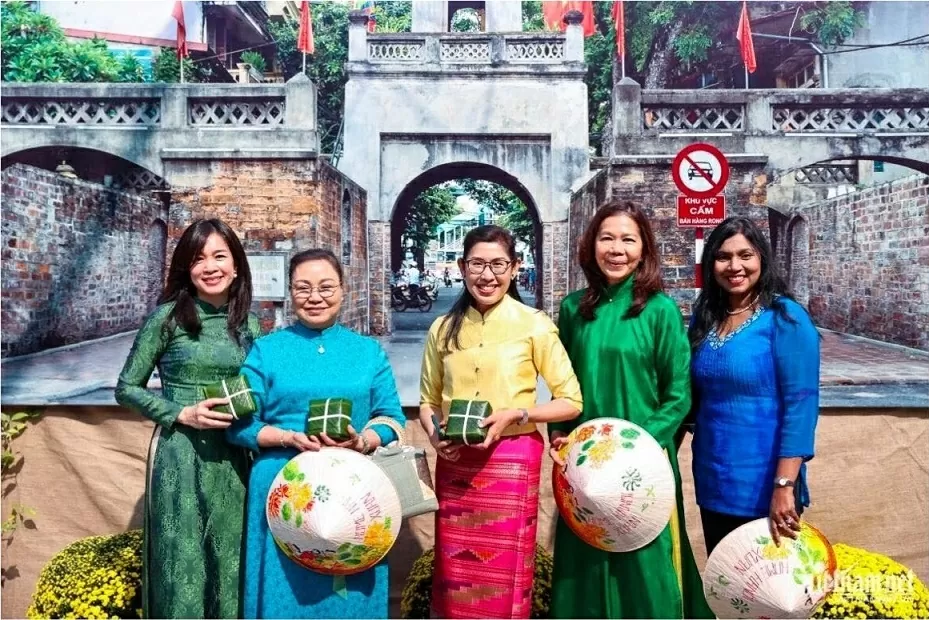
International Women's Day
Bringing women participate and lead in the digital era: UN Resident Coordinator
Latest
 |
| UN Resident Coordinator in Vietnam Pauline Tamesis in a forum for rights of the children in Vietnam. (Source: UN) |
As UN Resident Coordinator in Vietnam, could you touch on the role of Vietnamese women as the country is entering a new era?
With women comprising 50.1% of Vietnam’s population (GSO, 2023), women and girls have the potential to drive the country’s digital revolution. Digital technology and artificial intelligence are becoming a cornerstone of modern economies and societies, yet their benefits and opportunities are not equally distributed.
In the new era, women and girls can reap the economic benefits of the digital revolution, accessing new skills, opportunities and services, by bridging the digital gender gap and providing equal access to digital technology, financial services, markets and networks.
The Global Digital Compact provides a once-in-a-lifetime blueprint for our digital future: and it is unequivocal in saying that we cannot achieve that promised future without tackling systematic barriers for women and girls, ensuring they can lead, engage and reap the rewards, while also ensuring online safety and privacy.
 |
| Deputy Minister of Foreign Affairs Do Hung Viet receives UN Resident Coordinator in Vietnam Pauline Tamesis in Hanoi, March 5, 2025. (Photo: Quang Hoa) |
In your opinion, what outstanding achievements has Vietnam made in ensuring the rights of women and girls?
Vietnam has made remarkable strides in ensuring the rights of women and girls, owing to a strong legal framework and proactive policies.
Gender equality is now deeply embedded in key laws, including the Gender Equality Law, Law on Domestic Violence Prevention and Control, Law on Human trafficking, Labour Law, the recently amended Social Insurance Law, and others. These laws help protect women’s rights, prevent discrimination, and combat gender-based violence.
The revised Social Insurance Law, which takes effect in July 2025, introduced significant gender responsive provisions helping close the gender gap in accessing social insurance in Vietnam. Currently, only 16% of women aged 65 and over receive a pension compared to 27.3% of men. The new law lowers the age to receive social pension allowances for elderly individuals without pensions from 80 to 75, aiming to even this proportion. It also decreases the contribution period for pension eligibility from 20 to 15 years, which is particularly beneficial for women who are more likely to have shorter contribution periods due to caregiving responsibilities.
The National Strategy on Gender Equality (2021-2030) is major milestone in the journey to empower women in leadership and decision-making. In workplaces, policies ensure equal opportunities for promotions and leadership roles. In 2023, women’s labour force participation rate is estimated at 67.9%, notably higher than global average, while the share of women in the labour force at 48.6%. Support for women-owned small and medium enterprises (SMEs) has also grown significantly, with at least 2% annual growth in the number of women-led businesses between 2012 and 2022.
Vietnam is also tackling gender-based violence head-on. By 2024, the country has set up over 6,000 support centers offering essential services to survivors of domestic and gender-based violence. Nationwide campaigns, such as the annual Action Month for Gender Equality, are raising awareness and sparking conversations that challenge stereotypes and promote inclusivity.
Beyond legal reforms, Vietnam is actively closing gender gaps in education, employment, and business. The Politburo’s recent decision to waive tuition fees at public schools from preschool to the end of high school is a game-changer, ensuring that every child, girls and boys alike, can access quality education.
Vietnam achievements are a testament to its commitment to building a society where women and girls can thrive, lead, and live free from violence and discrimination.
 |
| Ms. Pauline Tamesis visits the Domestic violence prevention Club of Dien Bien Province. (Source: UN) |
In the context of digital transformation, what should women do to integrate and take the lead in this “digital wave”?
Vietnam’s rapid digital transformation, accelerated by Party Resolution 57, is shaping the country’s future. However, for digital progress to truly make a difference in people’s lives, it must be inclusive – ensuring that women are not left behind.
Firstly, education and skills are essential. In Vietnam, women dominate low-tech sectors like agriculture, textiles, and services. To keep these industries competitive, women must be equipped with the skills to adapt to emerging technologies, including artificial intelligence. The Government of Vietnam and UN agencies are actively developing accessible educational materials to ensure that digital technologies and skills benefit everyone.
Secondly, women must have equal opportunities to shape technologies and lead innovation. STEM fields drive innovation, digital transformation, and AI-based industrialization, yet women in Vietnam remain underrepresented in these fields. This starts in school. Boys significantly outnumber girls in pursuing careers in science, technology, engineering and mathematics (STEM).
In Vietnam, only 36% of female graduates completing tertiary education are in STEM fields. 78% of students enrolled at Polytechnic University in Hanoi are male. Girls who pursue STEM education must first surmount a series of systemic, social and cultural barriers. Research finds that both teachers and female students internalized cultural biases about their suitability to pursue STEM. This limits women’s access to a fast-growing industry and acts as a barrier for women to be in the driving seat of the digital transformation.
Policymakers play a crucial role by expanding access of women and girls to relevant education and developing digital policy with gender equality by design. Vietnam championed the ASEAN Inter-Parliamentary Assembly (AIPA) Resolution on “Digital Transformation led by Women and for Women.” As one of only two resolutions adopted at AIPA 2023, it is a testament to Vietnam’s commitment to gender-inclusive digital transformation.
Enterprises are equally key in supporting women currently in the job market to shape digital transformation. Enterprises can provide training and education for upskilling women employees, as well as cooperate with educational, technical and vocational training institutions to design and deliver digital curriculum. In addition, enterprises can recruit more women, especially for research and development positions.
Bringing women into technology results in more creative solutions and has greater potential for innovations that meet women’s needs and promote gender equality. The inclusion of women is key to unlock digital transformation’s potential for sustaining Viet Nam’s high economic growth.
 |
| Ms. Pauline Tamesis and female Ambassadors enjoyed experiencing Vietnamese customs. |
On the occasion of the International Women's Day. Is there anything you would like to say to the Vietnamese women?
In Vietnam, International Women’s Day is a beautiful celebration of flowers - a moment to honor women’s strength, resilience, and contributions to society.
Equally importantly, in 2025, we mark the thirtieth anniversary of the adoption of the Beijing Declaration and Platform for Action. This year’s International Women’s Day is a pivotal year to celebrate achievements, to acknowledge the persistent and emerging challenges, to call for accountability, and most importantly, to recommit to accelerate the achievement of gender equality and women’s empowerment.
The Beijing Platform for Action was adopted in 1995 at a time of change: democratic and human rights institutions were strengthening; and social movements were resurgent and on the march for rights and justice. Its thirtieth anniversary takes place in a year in which we face the most pressing global challenges, including fragile economies, the climate crisis, unprecedented levels of armed conflict and humanitarian crises, democratic erosion and backlash against gender equality, and declining optimism in the power of multilateralism to deliver shared, global solutions.
The Beijing Declaration and Platform for Action remains, to this day, the most revolutionary and progressive global framework for advancing women’s rights and gender equality. A focused and coordinated approach around a collective Beijing +30 Action Agenda is urgently needed to deliver not only on the SDG 5 (gender equality) but all the 17 Sustainable Development Goals.
We must come together to reduce poverty, to address insecurity, and to give women voice, choice and safety - actions that we know will accelerate delivery of the 2030 Agenda.
Let’s move forward together. Happy International Women’s Day!
Thank you for your insight!

















